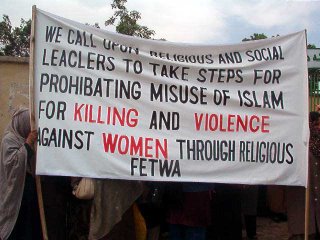CAMPAIGN FOR AFGHAN WOMEN AND GIRLS

While there has been a fair amount of attention being paid to America’s failed invasion and occupation in Iraq very little is being said about the debacle in Afghanistan. I don’t pretend to know as much about it as I would like to but I have gleaned a few pertinent facts over the past few years. Outside of the capital, Kabul there is very little that is actually “under control.” Warlords dominate the landscape and the Taliban is conducting a spring offensive in the south.
Even though the United States is conducting a “War on Terror” it is also still conducting another failing war, the “War on Drugs.” Since we invaded Afghanistan the major source of income is heroin. We seem to have turned a blind eye on this perhaps because this cash crop appears to be supplying mostly Europe and as we all know France is in Europe and for some reason the right wing believes France supports terrorism. (I would give you their argument but I can’t grasp it.) Not hard to see, however that if Europe is getting all the heroin it can handle that the US would be well stocked as well.
Laura Bush contends that we liberated women when we “defeated” the Taliban. This is not the case and certainly had nothing to do with why we invaded.
Protecting a Fragile Peace
Since December 2001, the United Nations, the Afghan
government, Afghan women leaders, and the Feminist
Majority have called upon the Bush Administration
and the international community to support expansion
of international peacekeeping forces throughout Afghanistan.
The current force of 8,500 troops is woefully
inadequate. As a result, deteriorating security has caused
the postponement of the first post-Taliban parliamentary
elections from June 2004 to September 2005. After two
delays, the Presidential election was held in October 2004.
Women and girls continue to be the focus of violence
and intimidation. More than 40 girls’ schools have been
set on fire, bombed, or violently attacked. Four women
registering women to vote were killed. Warlord restrictions
on women and threats against women who dare to exercise
their rights continue with impunity. The Taliban has reemerged
and is gaining strength. Urge an immediate and
full-scale expansion of the size and mandate of international
peacekeeping troops to include disarmament and
protection of women’s rights and human rights.
Rebuilding Afghanistan and Women’s Lives
Afghanistan is still waiting for the Marshall Plan that
President Bush promised in April 2002. Restoring Afghanistan
to merely a subsistence economy in which extremists
can again prosper will neither improve the status of women
Freeing Afghan Women: Unfinished Work
nor provide global security. Urge the Bush Administration
to support adequate reconstruction funding.
In 2002, women’s organizations, led by the Feminist
Majority, succeeded in having Congress authorize $60 million
for women’s programs, resulting in $5 million actually
appropriated for the Ministry of Women’s Aff airs in 2003.
The Afghan Women Security and Freedom Act of 2004,
introduced by Senator Barbara Boxer and Representative
Carolyn Maloney, sought $300 million per year for three
years for programs to aid Afghan women including direct
funding of $60 million for the Ministry of Women’s Affairs
and $30 million for the Afghan Independent Human
Rights Commission. Th e Act also specifi ed that not less
than 25 percent of funding for women in the overall bill
should be provided to Afghan women-led non-governmental
organizations and called for the expansion of international
peacekeeping forces. While this bill did not pass
Congress before it adjourned, it is anticipated that similar
legislation will be introduced in 2005. Congress did include
$50 million for programs that benefi t Afghan women and
girls and $7.5 million in direct funding for Afghan womenled
NGOs in its 2005 appropriations, provisions strongly
advocated by the Feminist Majority. Urge your Senators
and Representatives to support legislation to increase
funding for programs for Afghan women and girls, direct
funding for the Ministry of Women’s Aff airs, the Afghan
Independent Human Rights Commission and Afghan
women-led non-governmental organizations.
When the Taliban militia seized control of Afghanistan in 1996,
it violently took away the basic human rights of women and
girls to education, work, healthcare, and freedom of movement.
Afghan women lived under a brutal system of gender apartheid
until November 2001.
In January 2004, Afghanistan adopted a new constitution
providing equal rights for women and guaranteeing women
25% of seats in the lower house of the Parliament and 12% of
the upper house. Even under the new constitution, women’s
rights and human rights remain vulnerable to extremist judicial
interpretation. Failure to suffi ciently expand international
peacekeeping forces and the lack of sufficient funding for
reconstruction and governmental institutions threaten these
rights. Over one million people are homeless in the streets of Kabul. Worst of all, the Taliban and the warlords are re-emerging.
I thank Xoites for his guest blogging. He is a gifted writer and if you haven't checked his blog out yet, you surely should!!!
|
Question Girl
|






